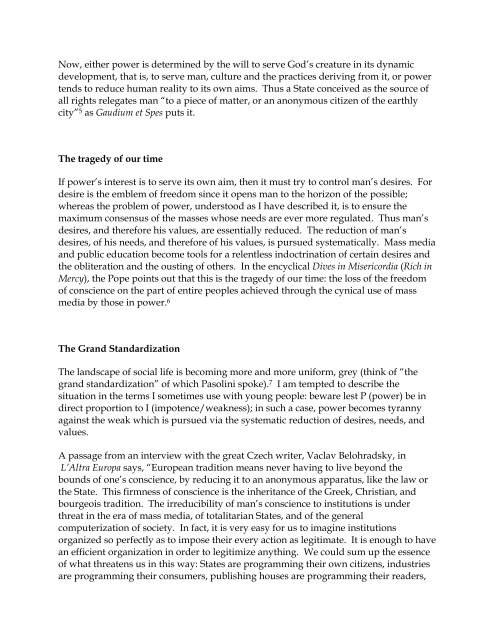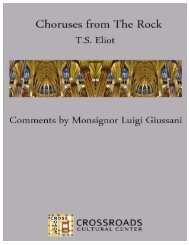The Religious Sense, Works, and Politics - Crossroads Cultural Center
The Religious Sense, Works, and Politics - Crossroads Cultural Center
The Religious Sense, Works, and Politics - Crossroads Cultural Center
You also want an ePaper? Increase the reach of your titles
YUMPU automatically turns print PDFs into web optimized ePapers that Google loves.
Now, either power is determined by the will to serve God’s creature in its dynamicdevelopment, that is, to serve man, culture <strong>and</strong> the practices deriving from it, or powertends to reduce human reality to its own aims. Thus a State conceived as the source ofall rights relegates man “to a piece of matter, or an anonymous citizen of the earthlycity” 5 as Gaudium et Spes puts it.<strong>The</strong> tragedy of our timeIf power’s interest is to serve its own aim, then it must try to control man’s desires. Fordesire is the emblem of freedom since it opens man to the horizon of the possible;whereas the problem of power, understood as I have described it, is to ensure themaximum consensus of the masses whose needs are ever more regulated. Thus man’sdesires, <strong>and</strong> therefore his values, are essentially reduced. <strong>The</strong> reduction of man’sdesires, of his needs, <strong>and</strong> therefore of his values, is pursued systematically. Mass media<strong>and</strong> public education become tools for a relentless indoctrination of certain desires <strong>and</strong>the obliteration <strong>and</strong> the ousting of others. In the encyclical Dives in Misericordia (Rich inMercy), the Pope points out that this is the tragedy of our time: the loss of the freedomof conscience on the part of entire peoples achieved through the cynical use of massmedia by those in power. 6<strong>The</strong> Gr<strong>and</strong> St<strong>and</strong>ardization<strong>The</strong> l<strong>and</strong>scape of social life is becoming more <strong>and</strong> more uniform, grey (think of “thegr<strong>and</strong> st<strong>and</strong>ardization” of which Pasolini spoke). 7 I am tempted to describe thesituation in the terms I sometimes use with young people: beware lest P (power) be indirect proportion to I (impotence/weakness); in such a case, power becomes tyrannyagainst the weak which is pursued via the systematic reduction of desires, needs, <strong>and</strong>values.A passage from an interview with the great Czech writer, Vaclav Belohradsky, inL’Altra Europa says, “European tradition means never having to live beyond thebounds of one’s conscience, by reducing it to an anonymous apparatus, like the law orthe State. This firmness of conscience is the inheritance of the Greek, Christian, <strong>and</strong>bourgeois tradition. <strong>The</strong> irreducibility of man’s conscience to institutions is underthreat in the era of mass media, of totalitarian States, <strong>and</strong> of the generalcomputerization of society. In fact, it is very easy for us to imagine institutionsorganized so perfectly as to impose their every action as legitimate. It is enough to havean efficient organization in order to legitimize anything. We could sum up the essenceof what threatens us in this way: States are programming their own citizens, industriesare programming their consumers, publishing houses are programming their readers,



